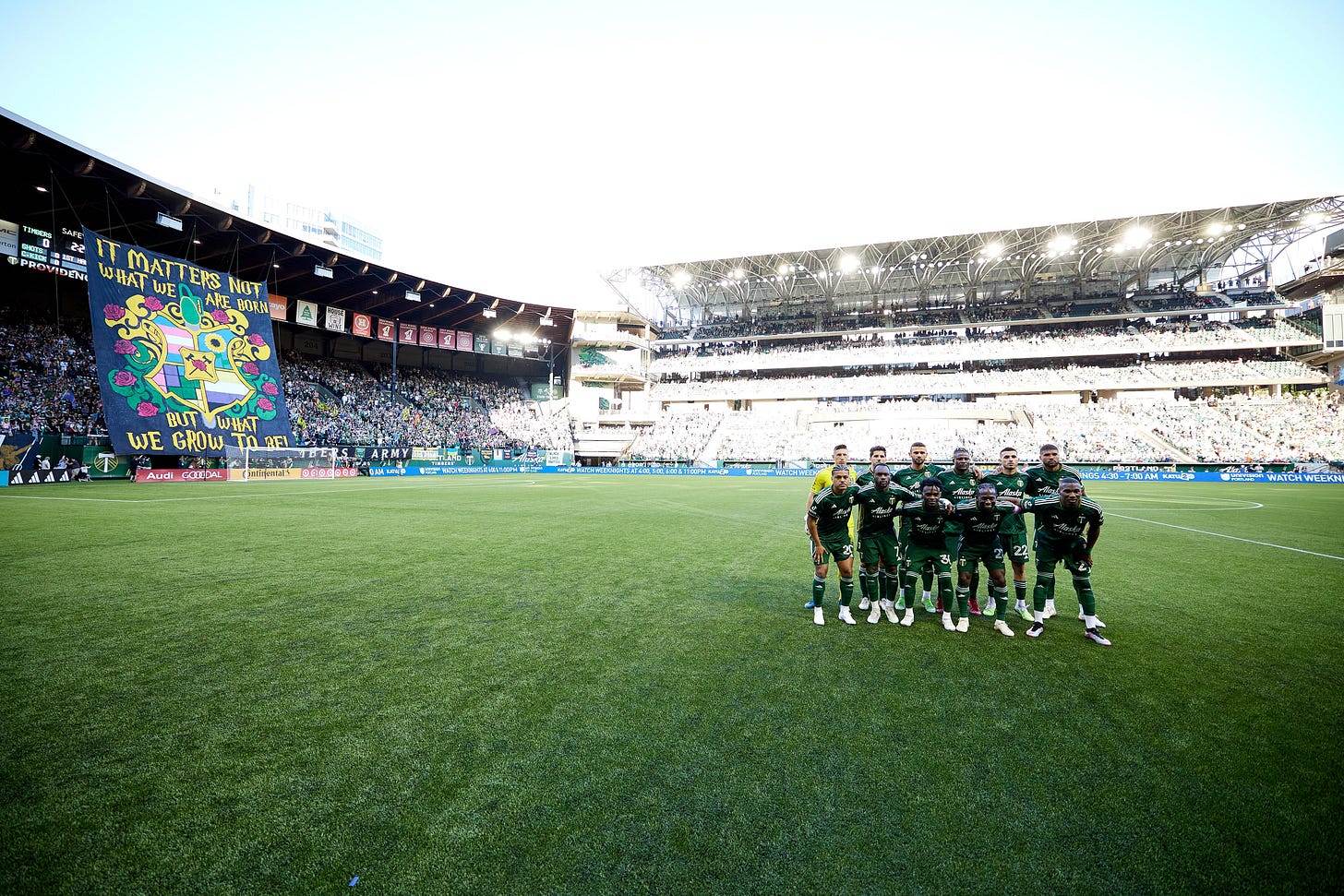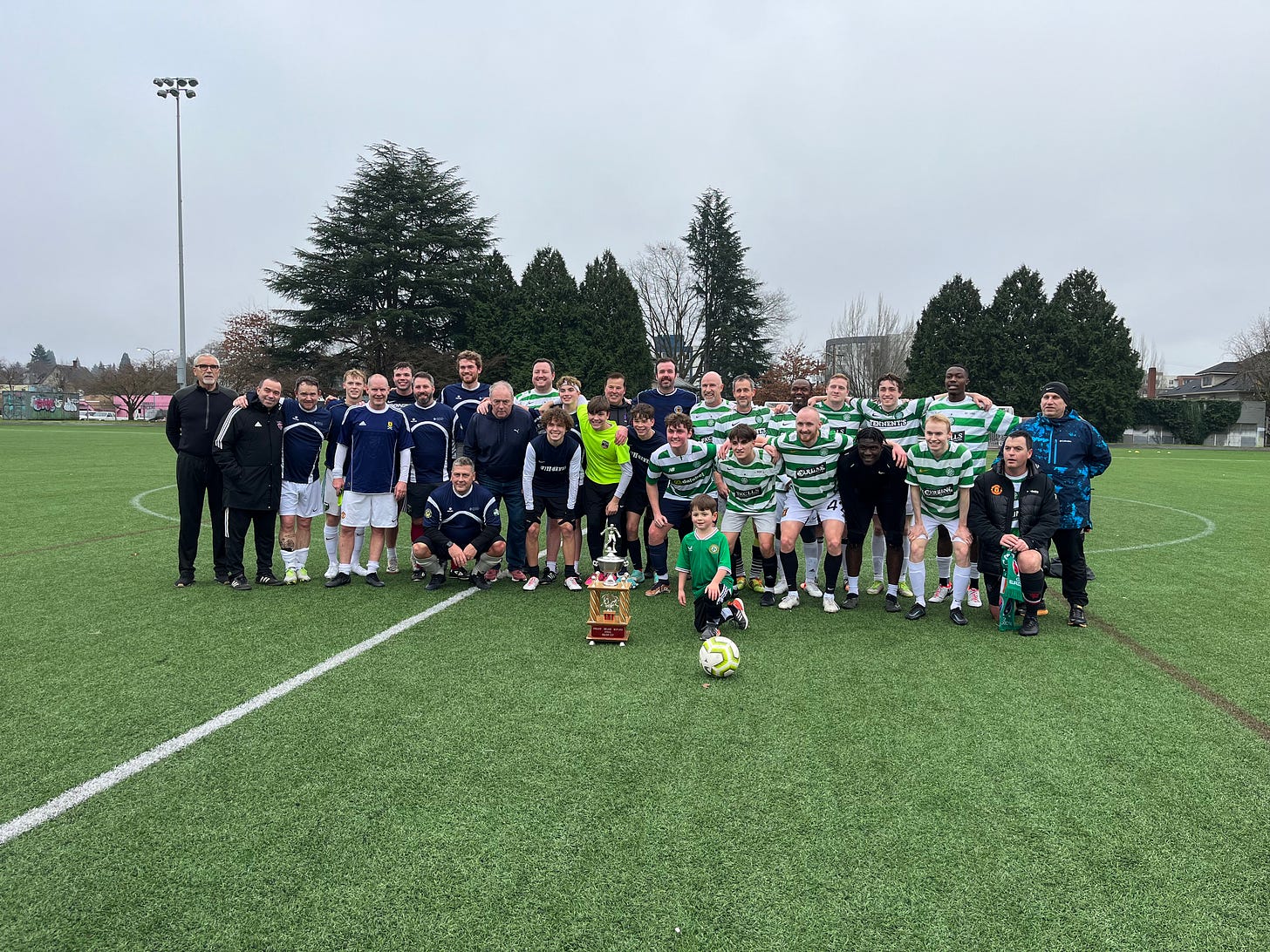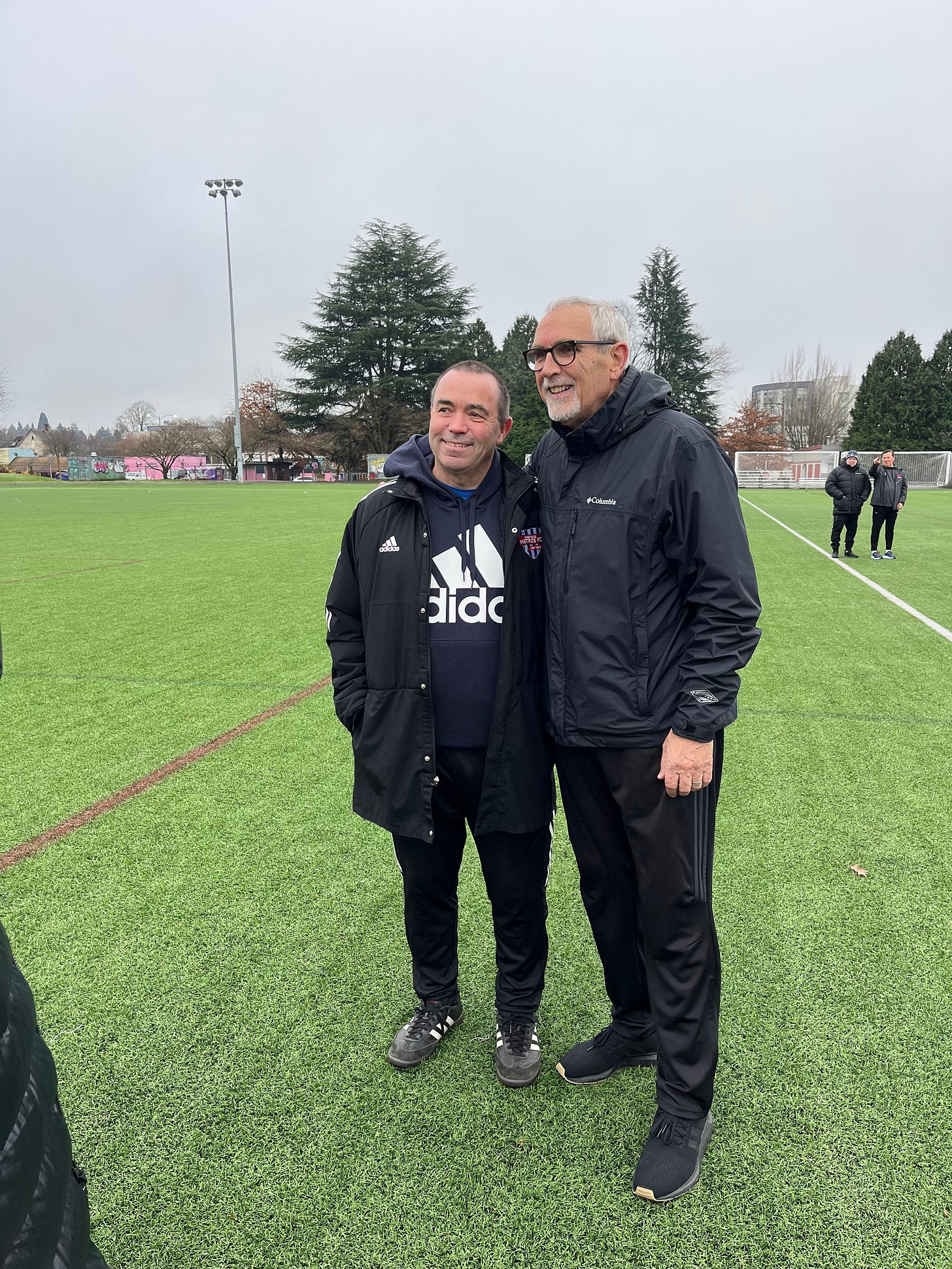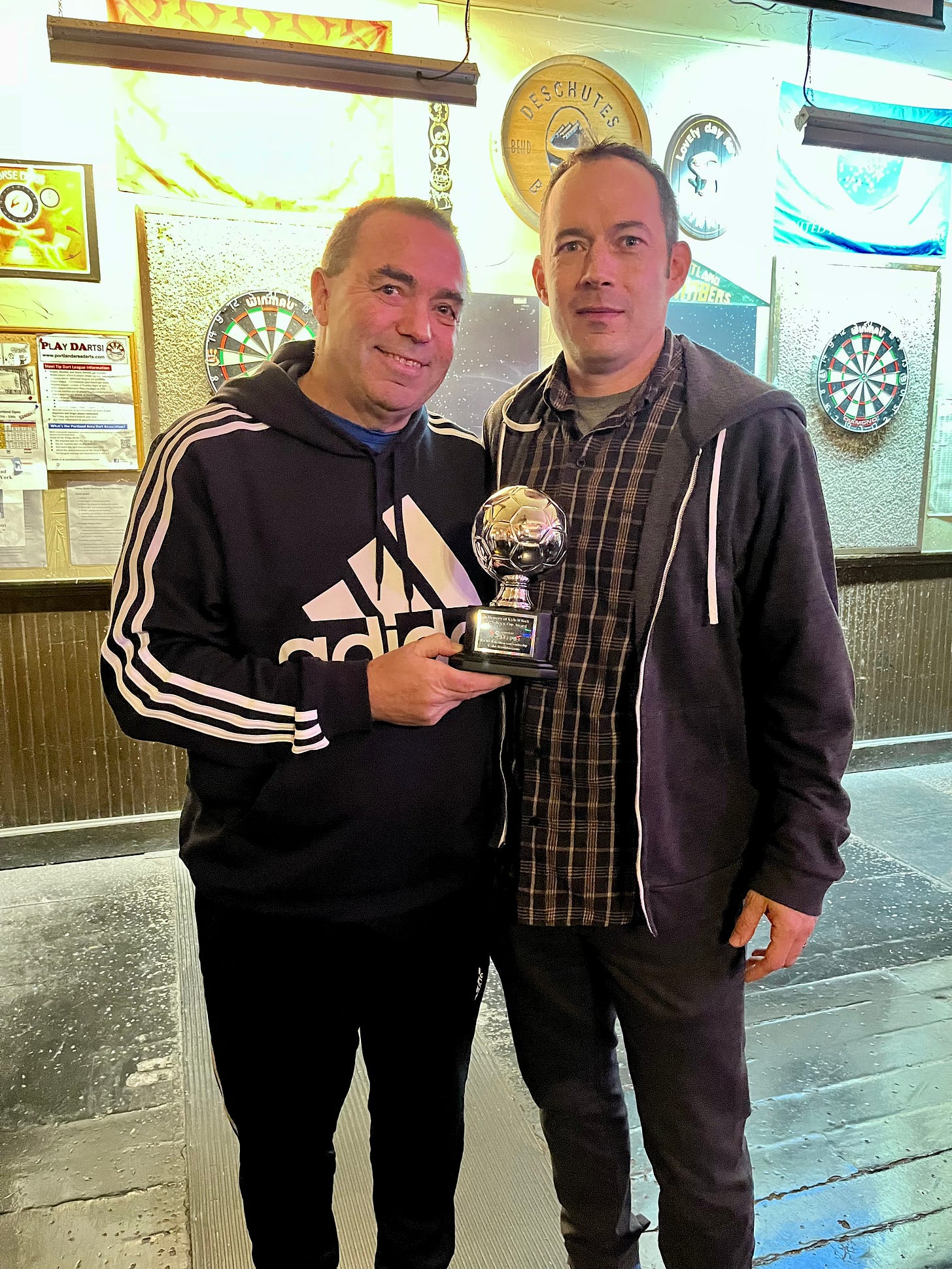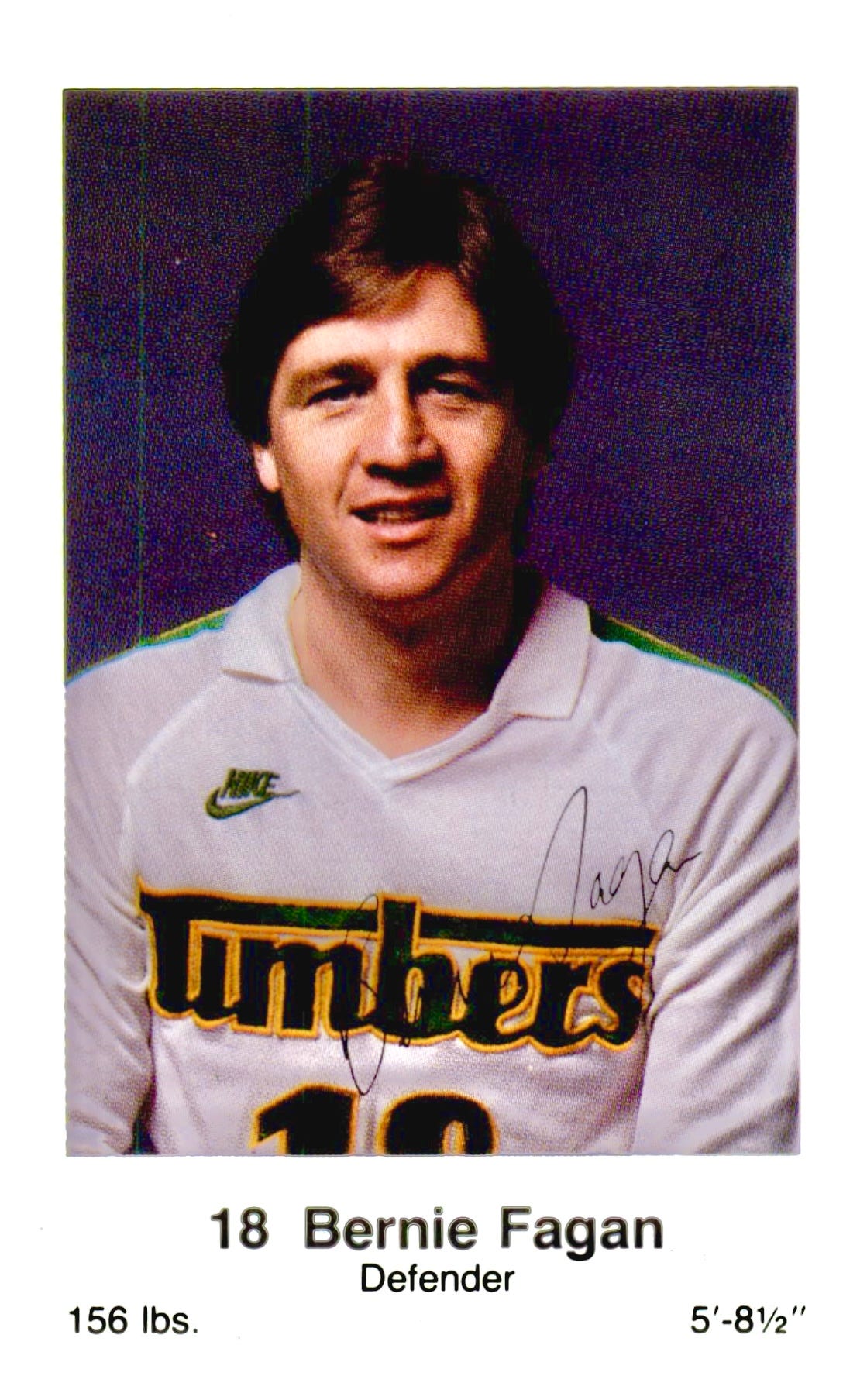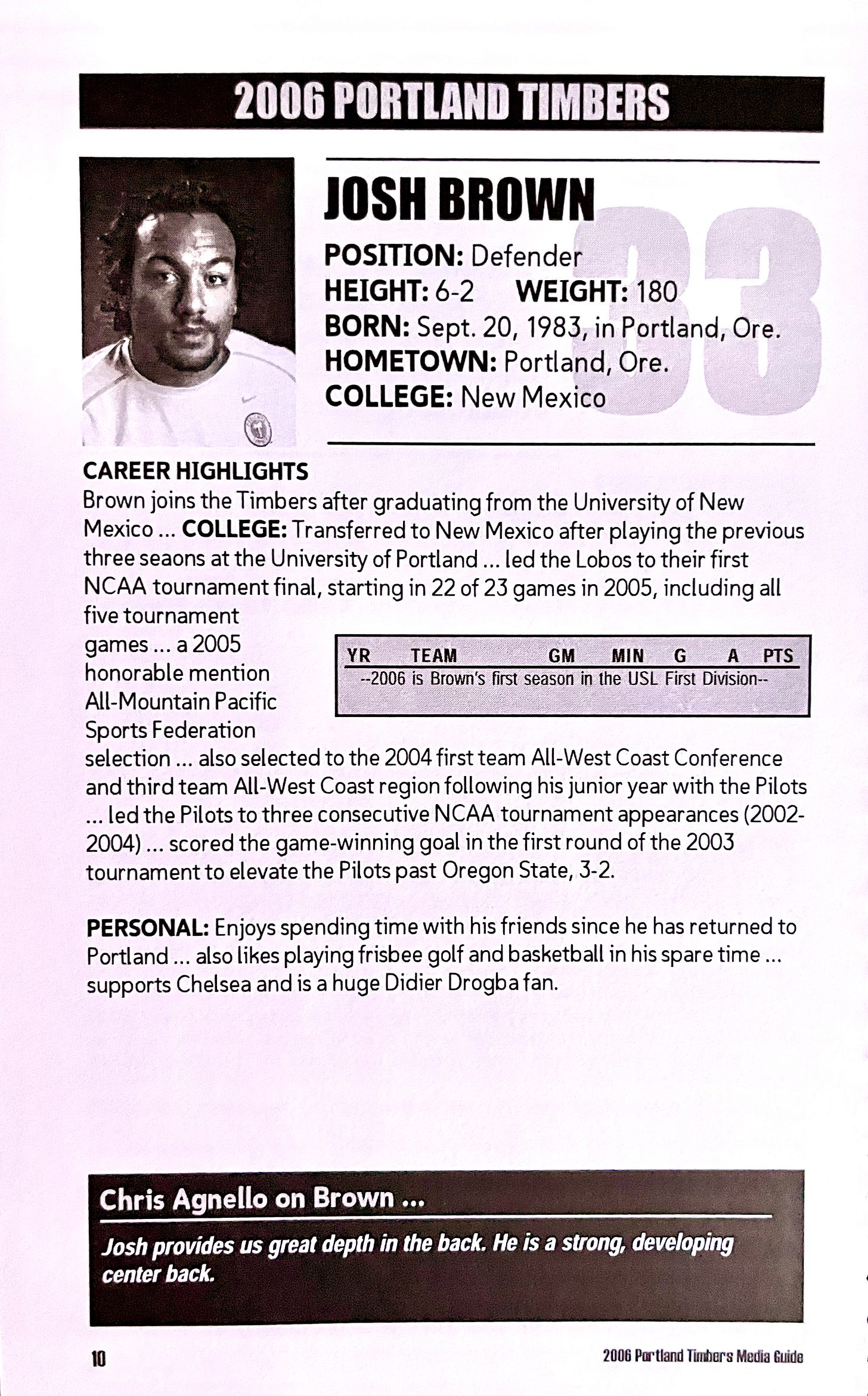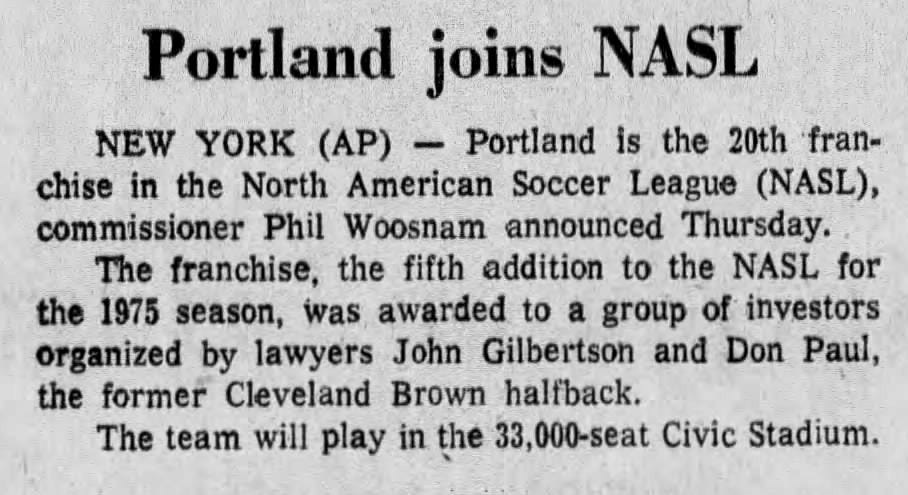In Media Res (June 2023)
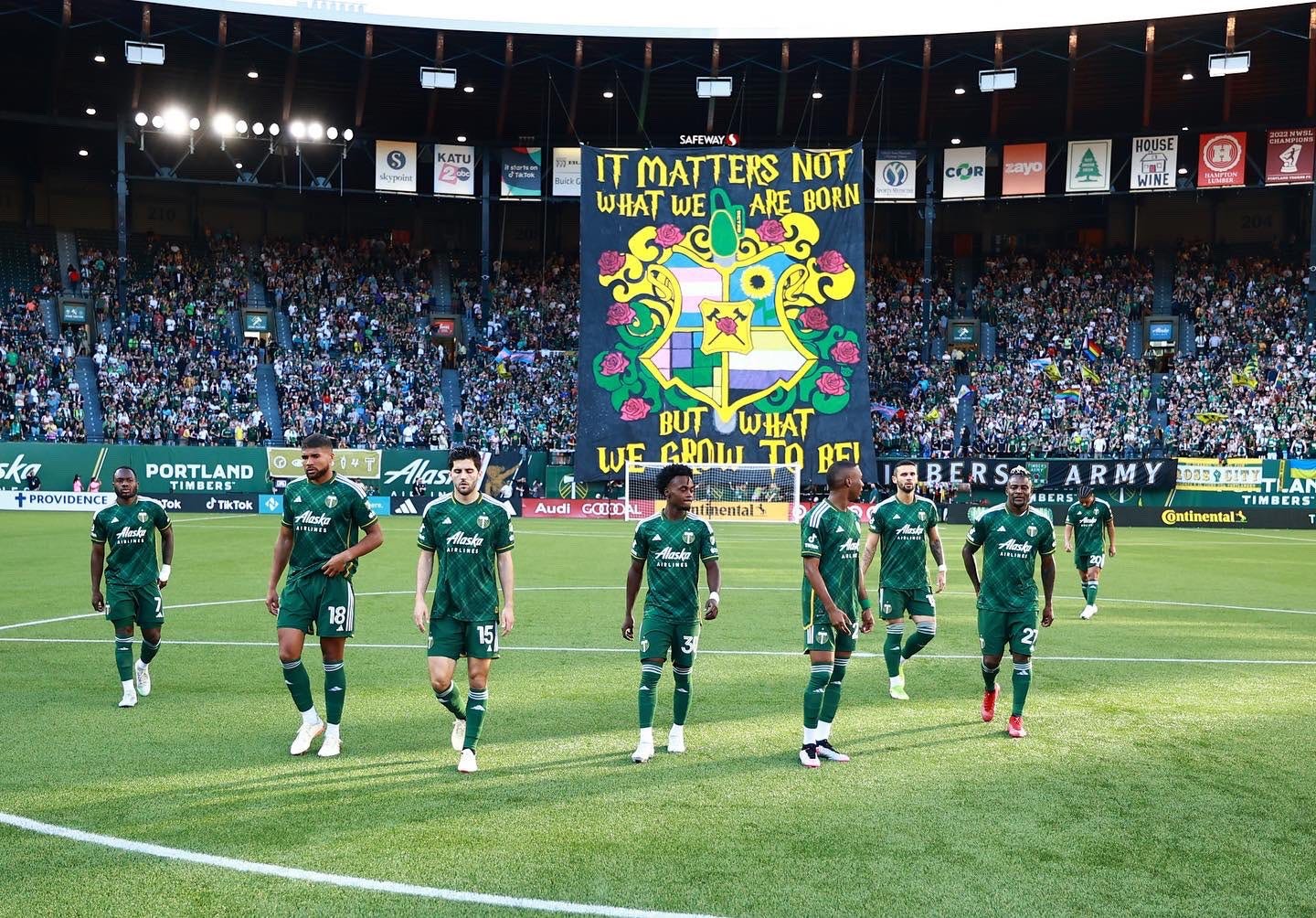
How many Timbers do you see in this photo?
No shame if your initial answer is eight. It’s a fair guess. You were likely counting those in the center circle.
Look beyond to get a better count. See behind the TIFO; include who is not currently in frame but at Providence Park. Add who is not in the picture at all. Don’t let time limit who makes the list.
Those fortunate enough to wear the badge are part of the picture. Like us, they are the current caretakers. They represent a moment in our history, when the center happens to be, as it’s always been, at field level of 1844 SW Morrison Street.
That’s where this month’s essay goes: to the middle of the field with three team photos, to show just how essential it is to have each other, to have this one place, that puts us all together in one massive team photo stretched across a half-century, a team that will always win, even when the results don’t go as planned. #RCTID.
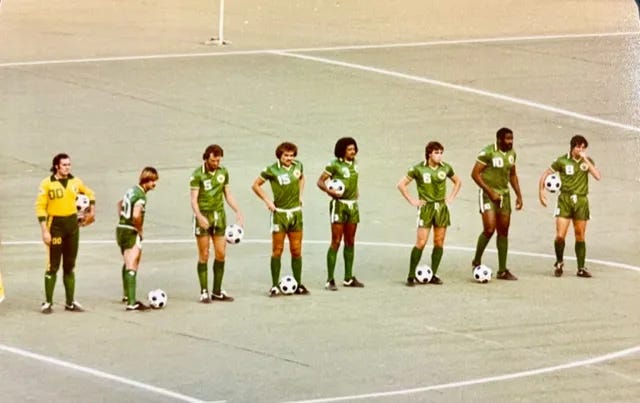
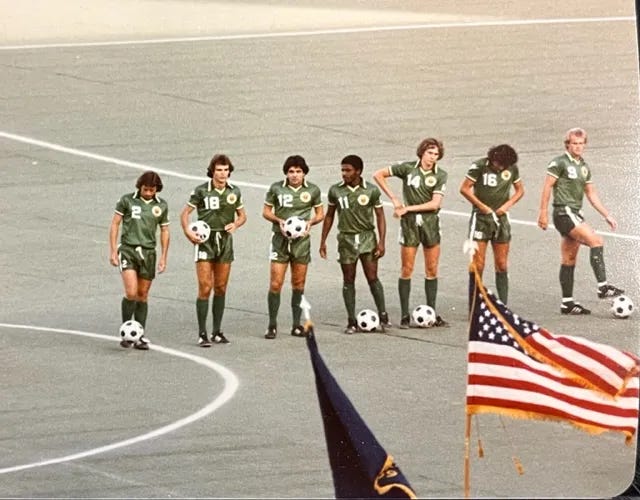
This is how the 1979 players lined up before that season’s finale, on August 12, in what would be a 3-1 home loss to the Johan-Cruyff-captained Los Angeles Aztecs, a side that included former 1975 Timber Chris Dangerfield. It was a match that would bring to a close a 1979 campaign that saw our Timbers finish last in the Western Conference, National Division of the NASL.
Sometimes results will go our way, and other times they won’t. To the good, this 1979 Portland Timbers side is the first-ever professional soccer team to sign a contract with Nike. On the other side of the interesting trivia lost to time, on April 14 of the season, the pre-match team photo looked a lot different, as the Timbers fielded replacement players because of an NASL players strike, in a match against the Minnesota Kicks. It was the game where Timbers Originals Ray Martin and Tony Betts suited up for the Kicks in front of a season-low 6,244 fans at Civic Stadium, where Tony Betts registered an assist against his former side in the 0-2 Timbers loss.
This 1979 match against the Aztecs was also the last under the original ownership group, as Oregon Soccer Inc. would sell the franchise to Louisiana Pacific just two months later. It was a tough year by many measures. Don Pollock, who was one of the original 60 investors of Oregon Soccer Inc., the ownership group that brought the NASL here in 1975, was then president, overseeing a changing league where team payrolls across the NASL would have to compete with teams owned by media conglomerates or backed by oil money.


After this match, Clyde Best couldn’t help but look across the field and see the big-name talent required to compete in the league. “It’s time,” he told the Oregon Journal's John Nolen, “that people here in Portland have something to shout about.” And later in that same article, Best added, “I’ve been saying it all along, but we need a Cruyff, or a Giorgio Chinaglia. We need players like them.”
Then-Timbers gaffer Don Megson would lose his job the next season, with the new ownership group handing Englishman Peter Warner the reins for a mid-season fortnight until the Timbers’ first-ever manager, Vic Crowe, returned on June 21, 1980. Megson-(Interim) Warner-Crowe is not exactly 2023’s Savarese-(Interim) Joseph-Neville, but change does happen in this sport. And all of them, like all of us, are once a Timber, always a Timber.
Still, the 15 players lined up in this photo did more for the rest of us than even a Soccer Bowl ‘79 win could have yielded. From left to right over the two pictures: Mick Poole, Gary Ayre, Graham Day, Alan Thompson, Clive Charles, John Bain, Clyde Best, Jimmy Conway, David Butler, Dale Mitchell, Willie Anderson, Elson Seale, Bruce Gant, Brian Gant, and Paul Toomey.
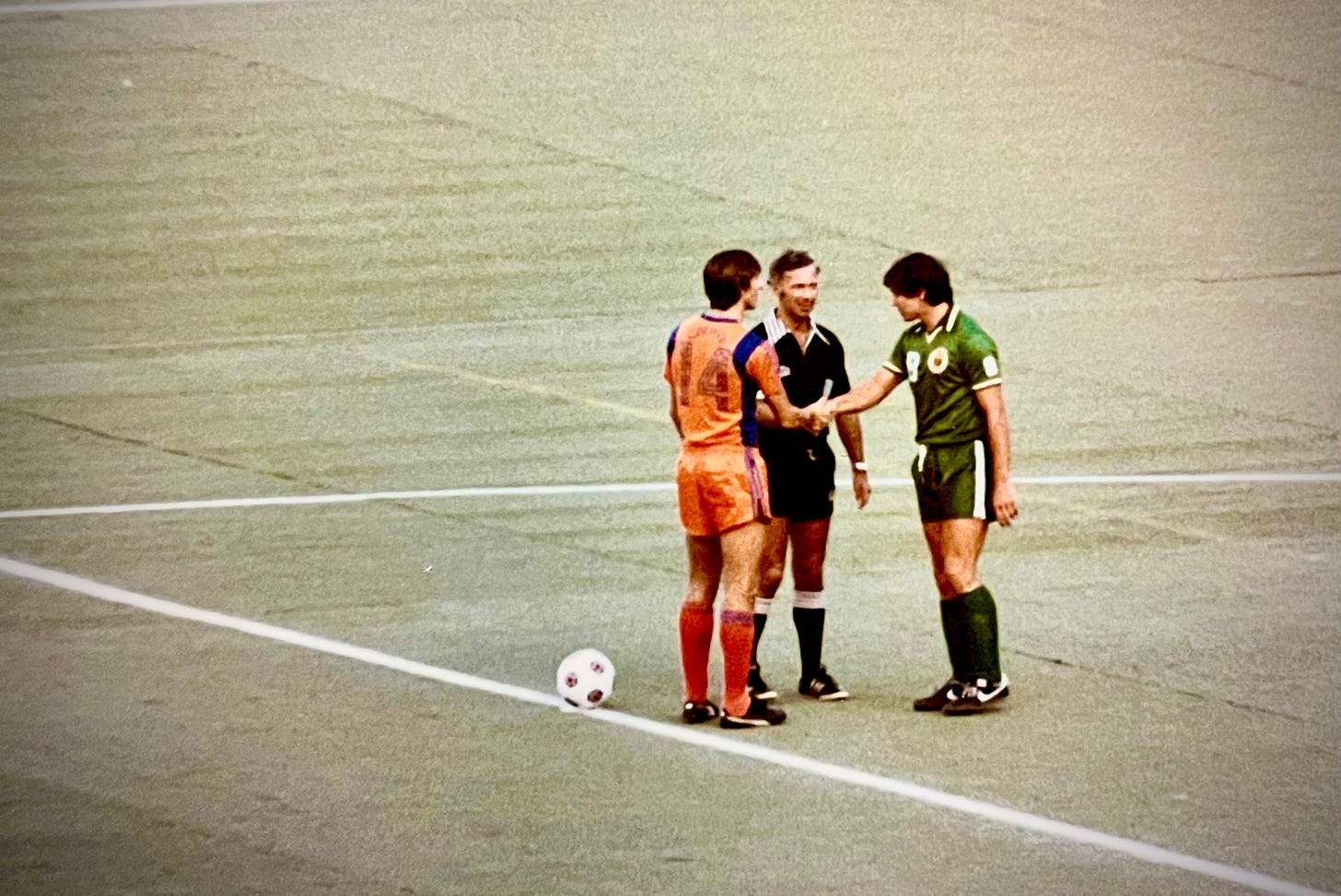
Many reading this know a lot of these players as coaches, as builders of our own soccer experiences of our youth; some watched them play or played alongside them. All of us are out there with them. What they gave still stands today.
“The more we play together, the better understanding we have of each other.” That’s as true to the theme of this essay as it was when Timbers’ defender Zac McGraw said it in the post-match press conference of this June 11 home win against Dallas. Above is the team photo from before the match, where the 2023 Timbers stood in the same spot, in the same stadium, as their 1979 teammates, the location the same as it was 44 years ago (though the turf, thankfully, is different).
McGraw, a Canadian International, was speaking to the team’s then-current coalescence, something badly needed at the time, the exact midpoint of the 2023 season where inconsistency in the team’s health and lineup reflected in the results.
Promise was on full display when Evander’s 35th-minute pass found Franck Boli, who headed home the only goal needed to secure full points.
As these players were still writing their on-the-field legacy, fans found there was still time (and hope) in the immediate. Players were getting healthy. After the team’s match 6 days earlier, a June 3 draw on the road to Seattle that put them in control of their own Cascadia Cup fate, the Timbers had three of the next four fixtures at home, setting up the month of June to be a massive catalyst for a team that needed it all to come together. This 1-0 win, taking 4 points from the first two games, looked to be the moment.
Of course, we now know the month didn’t go as planned. Though the team would only allow three goals all of June, they’d only score two moving forward. Two draws and a home loss following the Dallas match left Portland taking just two more points from a possible nine, with the second half of the season seeing results that ultimately led to manager Giovanni Savarese losing his job and the Timbers out of the playoffs for a second consecutive year, and Vancouver lifting the Cascadia Cup.
Whatever the moment may have meant in the season, it still belongs to our history. All of us. Though there may not have been time for perspective then, June can tell us a lot about who we are, as exemplified in the Timbers’ 76th-minute substitution in the last match of the month.
After a year away with a knee injury, Chilean forward Felipe Mora entered the match. The 14 minutes that followed mattered less than the significance of his return.
Post-match, Mora walked the lap of honor in Providence Park, the same tradition his 1975 teammates started, this time having been able to play again after a year of rehabilitation work. “It was a lot of feelings when the match was done and both my sons joined me [in the lap of honor],” Mora said in the post-match press conference. “Just being able to hug my wife, she goes through it alongside myself, so it’s very special for all of us.”
Mora was thankful for his family and the fans. “I didn’t expect so much noise and love when I entered the pitch tonight. I feel like I was born again when I came in.”
How big was our team that night? How many lifted one player and shared in the victory of that moment?
Everyone.
There’s another soccer tradition in Portland that brings us together, one nearly as old as the Timbers. “The exact beginning of the Bevy Cup is a little sketchy,” the Cup’s website reads, “but we believe it was started by Jack Morton as the Nation’s Cup in 1980.” Originally including teams with ties to and representing Ireland, England, Scotland, Germany, and the U.S., the initial version of the Cup lasted until 1986.
Then time passed.
In 1992, it returned, this time named The Bevy Cup. In its tenure, the annual event has brought together a collection of different European expats, around the game and each other, stretching generations but representing what is, ultimately, one soccer community.
Many former Timbers (and their sons) have played in the Cup over the years: Jimmy Conway, John Bain, Mick Hoban, Bernie Fagan, Tony Betts, Andrew Gregor, and Scot Thompson. That’s not an exhaustive roster.
The Bevy Cup even has a Hall of Fame, with names like Timbers Conway and Bain, and referee Eric Beck. Those familiar with the Green Is the Color podcast likely know it’s Eric who wrote and sings the song that opens and closes each episode.
And, those familiar with soccer in this area over the past four decades also know Eric as a referee and referee coordinator, from youth and local indoors to college and professional levels. Eric is in the Region IV Adult Soccer Hall of Fame, where the Region’s Referee Lifetime Achievement Award has just this year been renamed in his honor.
This season’s Bevy Cup (a one-match tie between Scotland and Ireland) kicked off on New Year’s Eve, at Buckman Field in inner Northeast Portland. And true to form, Eric got it going with a mostly formal note. “We’ll play 35-minute halves,” he told the Scotland coach John Bain. “Unless you’re ahead in the second half, and we’ll go down to 20.”
In a moment of great gravity, Timbers Ring of Honor Member John Bain pulled everyone from both sides together. “Obviously, with the Bevy Cup, we’ve had a lot of tradition and a lot of people who have been involved over the years,” he told the gathered players. “Bernie Fagan, as many of you know, him and his sons Ross and Ian have played in the Bevy Cup for many years, and Bernie has taken a turn for the worse with his health.” None there, not even John, knew at the time that Bernie had already passed, but all felt his presence in his name’s mention.
As for the soccer, Ireland easily claimed the Cup in a match that wasn’t close—but the sport is secondary. Whatever time it was that passed over the halves, it was spent together around the game with each other.
“The more we play together, the better understanding we have of each other.”
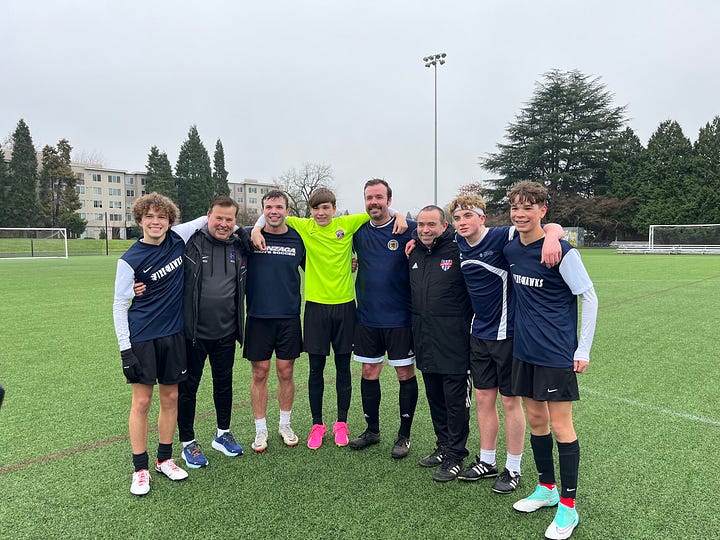
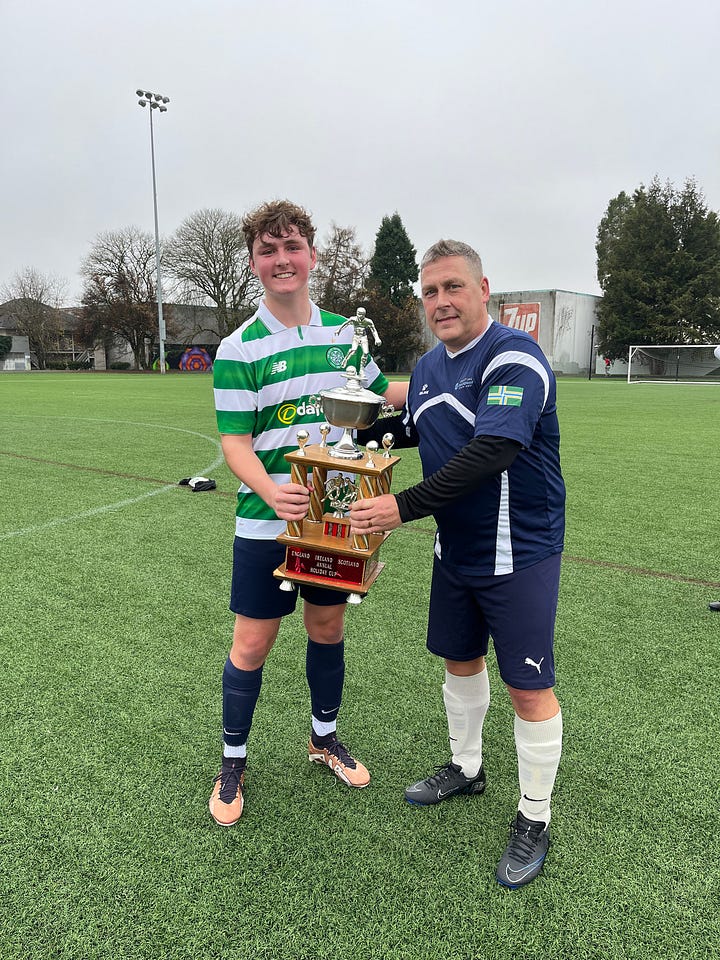
After the match, all headed to The Horse Brass Pub, itself somewhat of a Portland Soccer institution, with NASL and Timbers ephemera covering parts of the walls and ceiling, including a framed Graham Day #5 Timbers Jersey. (Coincidentally, it was Day who scored the one goal in that 1979 season finale against the Aztecs.)
Partway through the festivities, Eric Beck requested everyone’s attention. He was starting a new tradition in the Bevy Cup: A proper person-of-the-Cup award to be handed out that day and each year going forward. The award is named for his son, Kyle Beck, who passed away in January of 2022. Many in that room knew Kyle from when he was a kid, from hanging around the sidelines at fields where his dad refereed. Kyle also played for John Bain, as many have been fortunate to do. Eric wanted to honor his son’s name in the community where he’ll always live: our community, around the game of soccer.
Because of the work I’ve been doing here with Green Is the Color, to collect and share our soccer stories, Eric asked if I would present the award. I was honored to participate and present it to John Bain, a person whose contribution to soccer here is immeasurable.
The next Bevy Cup will be December 31, 2024.
Zac McGraw couldn’t have been more on point: “The more we play together, the better understanding we have of each other.” As the Timbers near 50 years, we’ve had the opportunity to be together a lot. Making our stories and our culture. A lot of players, a lot of supporters. A lot of us—more than we could count.
And when we lose a few Timbers, a few of us, as we did in a short spell this holiday season, we need to make sure they are never forgotten, lest we lose the moments that make us who we are, lest our team photo end up empty. #RCTID
Bernie Fagan (1949–2023)
Bernie played for the Timbers 1980–82 and will most likely be remembered for his contributions building the game here after his playing days. Bernie was a long-time coach for Warner Pacific University and Portland State University. Over the years, Bernie’s camps and club coaching provided thousands of kids the opportunity to play soccer. Bernie was also involved in the Special Olympics, where he was the Soccer Director 1991–2004.
Pernell “Josh” Brown (1983–2023)
Josh grew up in Portland and played his high school soccer at Jesuit High School, where he won three consecutive state championships. Josh played club soccer for Jim Rilatt (who has Timbers ties dating back to the team’s origins, as well) at FC Portland Academy. Josh played collegiately for Clive Charles before finishing his college career at The University of New Mexico. Josh played for the Timbers in 2006, where I’ve heard he wore the number 33 in honor of Charles, whose number 3 is retired by the club. After playing, Josh gave back to the game, coaching high school and club soccer in the Portland area.
Don Pollock (1934–2024)
Don was an original investor in Oregon Soccer Inc., the group that brought the first NASL franchise to Portland in 1975. In 1979, Don was president of Oregon Soccer Inc., seeing the team through that season and the transition to Louisiana Pacific’s ownership. I can’t imagine how hard it must have been to keep that franchise going at that time, but I’m grateful to be learning about the people who came here then and what they did, and I’m thankful for the first 60 investors, Mr. Pollock included, who made our club exist.



